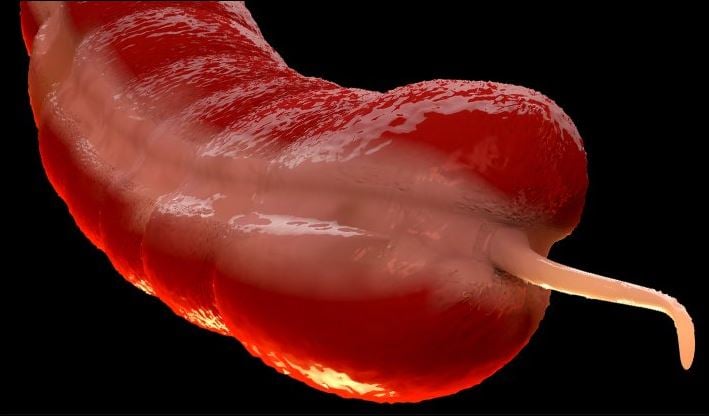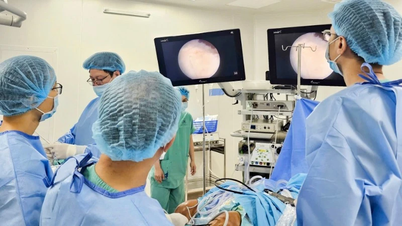For decades, it was a disease a doctor might see only a few times in his career, and it usually occurred in older people. But now, more and more patients in their 30s and 40s, and even younger, are being diagnosed with the disease.

Illustration photo.
Abnormal increase
According to a study published in the Annals of Internal Medicine, the number of appendiceal cancer cases has increased three to four times in people born after the 1970s compared with the generation born in the 1940s.
Although the total number of cases is still low, only a few cases per million people per year, the trend is increasing rapidly and alarmingly. Notably, about 1/3 of the cases now occur in people under 50 years of age, much higher than other types of digestive tract cancer.
Why are young people more affected?
The exact cause remains unknown. However, experts say dramatic changes in lifestyle and environment over the past few decades may play a role.
Obesity on the rise: Since the 1970s, rates of overweight and obesity have increased dramatically, a risk factor for many types of cancer.
Dietary changes: High intake of processed foods, sweets, red meat and processed meat – which have been shown to increase the risk of gastrointestinal cancers.
Sedentary lifestyle: Sedentary lifestyles with little physical activity are becoming more common.
Environmental impacts: Food industrialization, plastics, chemicals, changes in water quality… are also questioned.
Antibiotics: The overuse of antibiotics in medicine and agriculture can affect the gut microbiome, an increasingly important factor in cancer risk.
Hard to detect, easy to miss
Unlike colon cancer, which can be screened by endoscopy, appendiceal cancer has virtually no early detection tools.
Symptoms are often vague, such as mild abdominal pain, bloating, and indigestion, and can be easily confused with other benign diseases. Most cases are only discovered by chance after appendicitis surgery, when it is too late for early intervention.
The disease is so rare that there is no regular screening program, requiring both doctors and patients to be more vigilant for unusual signs, especially in people under 50 years old.
A worrying general trend
Appendiceal cancer is just part of a larger picture as many gastrointestinal cancers, such as colon and stomach cancer, are also on the rise in young people.
This suggests that there may be common risk factors, ranging from genetics, lifestyle, environment to changes in the gut microbiome.
There is currently no way to screen for appendix cancer early, so the most feasible measure is prevention such as maintaining a reasonable weight, eating plenty of green vegetables, fruits, whole grains, limiting alcohol, tobacco, processed foods and exercising regularly.
These steps can't guarantee prevention of appendix cancer, but they have been shown to reduce the risk of many other cancers and improve overall health.

A healthy lifestyle helps reduce the risk of developing appendiceal cancer.
A warning from a rare disease
The unusual rise in appendix cancer is a reminder that even rare diseases can become more common as environments and lifestyles change.
Scientists are working hard to find answers, but in the meantime, it is important that everyone listens to their bodies, goes to the doctor when they have unusual symptoms, and raises awareness so as not to miss the opportunity for early treatment.
Source: https://doanhnghiepvn.vn/tin-tuc/mot-can-benh-ung-thu-bi-lang-quen-dang-gia-tang-o-nguoi-tre-khien-cac-chuyen-gia-boi-roi/20250913091557470


![[Photo] General Secretary To Lam receives US Ambassador to Vietnam Marc Knapper](https://vphoto.vietnam.vn/thumb/1200x675/vietnam/resource/IMAGE/2025/9/29/c8fd0761aa184da7814aee57d87c49b3)
![[Photo] The 1st Congress of Phu Tho Provincial Party Committee, term 2025-2030](https://vphoto.vietnam.vn/thumb/1200x675/vietnam/resource/IMAGE/2025/9/30/1507da06216649bba8a1ce6251816820)
![[Photo] Solemn opening of the 12th Military Party Congress for the 2025-2030 term](https://vphoto.vietnam.vn/thumb/1200x675/vietnam/resource/IMAGE/2025/9/30/2cd383b3130d41a1a4b5ace0d5eb989d)
![[Photo] General Secretary To Lam, Secretary of the Central Military Commission attends the 12th Party Congress of the Army](https://vphoto.vietnam.vn/thumb/1200x675/vietnam/resource/IMAGE/2025/9/30/9b63aaa37ddb472ead84e3870a8ae825)






























![[Photo] General Secretary To Lam attends the ceremony to celebrate the 80th anniversary of the post and telecommunications sector and the 66th anniversary of the science and technology sector.](https://vphoto.vietnam.vn/thumb/1200x675/vietnam/resource/IMAGE/2025/9/29/8e86b39b8fe44121a2b14a031f4cef46)































































Comment (0)